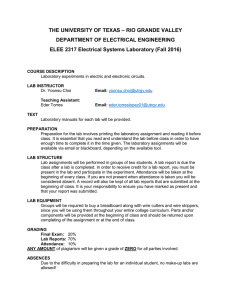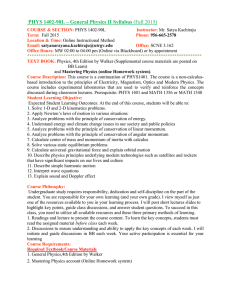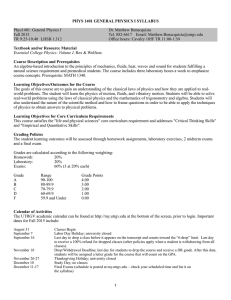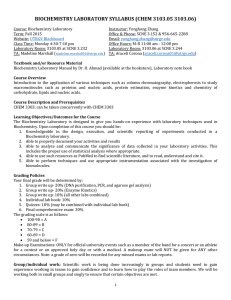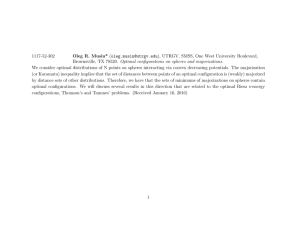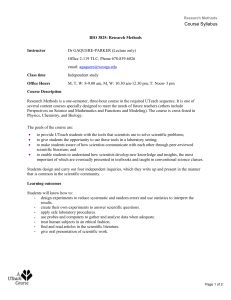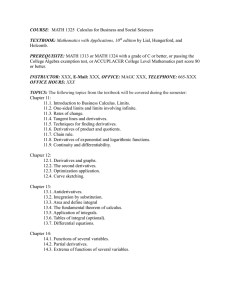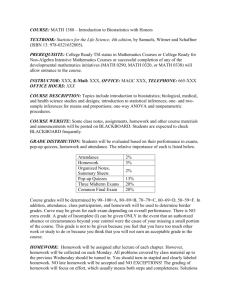Textbook and Resource Material Course Description and
advertisement
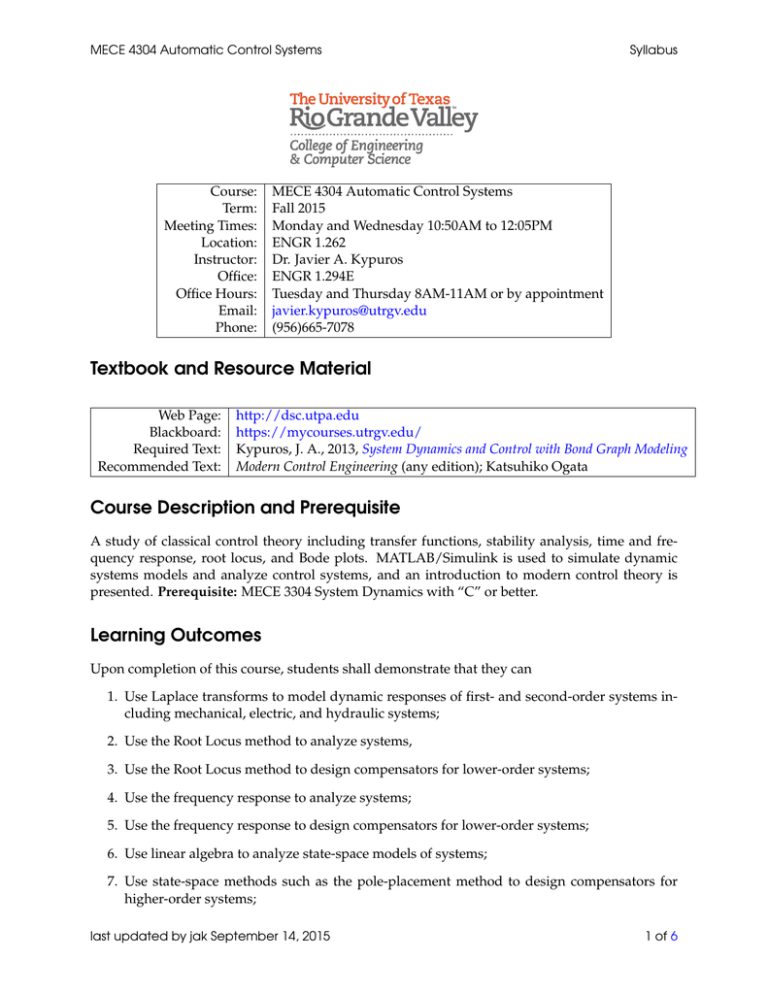
MECE 4304 Automatic Control Systems Course: Term: Meeting Times: Location: Instructor: Office: Office Hours: Email: Phone: Syllabus MECE 4304 Automatic Control Systems Fall 2015 Monday and Wednesday 10:50AM to 12:05PM ENGR 1.262 Dr. Javier A. Kypuros ENGR 1.294E Tuesday and Thursday 8AM-11AM or by appointment javier.kypuros@utrgv.edu (956)665-7078 Textbook and Resource Material Web Page: Blackboard: Required Text: Recommended Text: http://dsc.utpa.edu https://mycourses.utrgv.edu/ Kypuros, J. A., 2013, System Dynamics and Control with Bond Graph Modeling Modern Control Engineering (any edition); Katsuhiko Ogata Course Description and Prerequisite A study of classical control theory including transfer functions, stability analysis, time and frequency response, root locus, and Bode plots. MATLAB/Simulink is used to simulate dynamic systems models and analyze control systems, and an introduction to modern control theory is presented. Prerequisite: MECE 3304 System Dynamics with “C” or better. Learning Outcomes Upon completion of this course, students shall demonstrate that they can 1. Use Laplace transforms to model dynamic responses of first- and second-order systems including mechanical, electric, and hydraulic systems; 2. Use the Root Locus method to analyze systems, 3. Use the Root Locus method to design compensators for lower-order systems; 4. Use the frequency response to analyze systems; 5. Use the frequency response to design compensators for lower-order systems; 6. Use linear algebra to analyze state-space models of systems; 7. Use state-space methods such as the pole-placement method to design compensators for higher-order systems; last updated by jak September 14, 2015 1 of 6 MECE 4304 Automatic Control Systems Syllabus 8. Use MATLAB/Simulink or other similar numerical simulation package as a tool to analyze and design classical compensators including lead-lag type compensators and proportionalintegral-derivative (PID) type compensators; 9. Communicate the development and synthesis of control system designs through written and oral means; Grading Policies Component Exercises Midterm Report Final Report G RADING Percentage Details 50 Homework assignments 20 2-page report plus appendix 30 5-page report plus appendix Exercises: It is highly recommended that homework be submitted in the format described below. Each problem should have the following sections if appropriate: 1. Problem Statement. Restate the problem and include any schematics given to help describe the problem. 2. Given. List the given parameters including symbols, values with units, and descriptions. 3. Find. Briefly describe what the problem asks you to solve for. 4. Solution. Provide a detailed solution showing all steps. Insure that the detail provided is sufficient for another to clearly follow how the solution was derived. 5. Remarks. Comment on the solution. Does it make sense? If so, why? Is there anything that remains unclear for which you would like further clarification? If so, what? Homework must be submitted neatly on 8.5 inch by 11 inch paper. It should be stapled in the top left corner and hole-punched for a standard 3-ring binder. Grid engineering paper is preferred. Only one side of the paper should be used; the back side should be left blank to be used later for corrections and review notes. As in most any Engineering course, the material is best mastered through practice. Homework is one’s best opportunity to practice the concepts learned in lecture. Moreover, the material in this course can only be mastered through practice. As such, what matters most is one’s genuine and active participation. Note that homework accounts for 5% of the final grade. Assignments will be graded based primarily on effort demonstrated. The rubric below will be used for grading. last updated by jak September 14, 2015 2 of 6 MECE 4304 Automatic Control Systems Score 5, Excellent 4, Good 3, Fair 2, Poor 1, Unacceptable 0, Missing Syllabus Description All problems were attempted. All work is shown. Solutions were neat and use required format. Nearly all problems were attempted (missing 1 at most). Steps were sufficiently detailed. Most problems were attempted (missing at most 2 problems). Steps may not be sufficiently detailed Majority of problems were attempted. Steps were missing or solutions were incomplete. A few problems were attempted. Solutions were incomplete. Work was missing for the majority of problems. Assignment was not submitted. Late Homework. Homework is mandatory and must be submitted in a timely fashion! Late homework will not be accepted without prior approval. If you have an exigent circumstance, contact Dr. Kypuros immediately to make arrangements prior to the due date. Collaborating on Homework. Though students are encouraged to collaborate on homework assignments, the work submitted should reflect the student’s own effort and understanding of the material. If there is evidence that the student is copying solutions from another or a solution manual, the incident will be reported to the Dean of Students Office as required by the Student Conduct Code (see section below on Academic Integrity and Dishonesty for further details). Calendar of Activities Week(s) 1 2 3 4 5-6 7-8 8 9-10 11 12-13 14 15 C OURSE S CHEDULE Topic Book Section(s) Introduction to Control Systems N/A Mathematical Modeling (Review) 4.2-4.7, 5.7, 6.2, & 6.10 Time Domain Analysis (Review) 7.2-7.7 Frequency Domain Analysis (Review) 8.2, 8.3, & 8.7 Classical Compensation 9.2-9.6 The Root Locus Method 9.7-9.8 Tuning of PID Compensators 9.9 Frequency Response Method 9.10-9.11 State Feedback Control Analysis 10.2-10.3 State Feedback Control Design 10.4-10.6 State Observers 10.7 MIMO Control 10.13 Part Modeling and Analysis Classical Control Modern Control UTRGV Policy Statements Studuents with Disabilities: If you have a documented disability (physical, psychological, learning, or other disability which affects your academic performance) and would like to receive aca- last updated by jak September 14, 2015 3 of 6 MECE 4304 Automatic Control Systems Syllabus demic accommodations, please inform your instructor and contact Student Accessibility Services to schedule an appointment to initiate services. It is recommended that you schedule an appointment with Student Accessibility Services before classes start. However, accommodations can be provided at any time. Brownsville Campus: Student Accessibility Services is located in Cortez Hall Room 129 and can be contacted by phone at (956) 882-7374 (Voice) or via email at accessibility@utrgv.edu. Edinburg Campus: Student Accessibility Services is located in 108 University Center and can be contacted by phone at (956) 665-7005 (Voice), (956) 665-3840 (Fax), or via email at accessibility@utrgv.edu. Mandatory Course Evaluation Period: Students are required to complete an ONLINE evaluation of this course, accessed through your UTRGV account (my.utrgv.edu); you will be contacted through email with further instructions. Online evaluations will be available Nov. 18 – Dec. 9, 2015. Students who complete their evaluations will have priority access to their grades. Attendance: Students are expected to attend all scheduled classes and may be dropped from the course for excessive absences. UTRGV’s attendance policy excuses students from attending class if they are participating in officially sponsored university activities, such as athletics; for observance of religious holy days; or for military service. Students should contact the instructor in advance of the excused absence and arrange to make up missed work or examinations. Department-Specific Attendance Requirements: 1. Attendance will be taken every time the class meets. Any student arriving to class 5 minutes after the class has started will not be allowed in class. Students will be allowed a maximum of three absences for the whole semester for classes meeting twice a week, two absences for classes meeting once a week, and one absence for laboratory courses. Five points will be deducted from the total (100%) for each absence exceeding the maximum allowable unless documentation justifying that absence is provided. 2. Students will not be permitted to leave the classroom during lectures and exams except for extreme emergencies. Scholastic Integrity: As members of a community dedicated to Honesty, Integrity and Respect, students are reminded that those who engage in scholastic dishonesty are subject to disciplinary penalties, including the possibility of failure in the course and expulsion from the University. Scholastic dishonesty includes but is not limited to: cheating, plagiarism, and collusion; submission for credit of any work or materials that are attributable in whole or in part to another person; taking an examination for another person; any act designed to give unfair advantage to a student; or the attempt to commit such acts. Since scholastic dishonesty harms the individual, all students and the integrity of the University, policies on scholastic dishonesty will be strictly enforced (Board of Regents Rules and Regulations and UTRGV Academic Integrity Guidelines). All scholastic dishonesty incidents will be reported to the Dean of Students.1 Sexual Harassment, Discrimination, and Violence: In accordance with UT System regulations, your instructor is a “responsible employee” for reporting purposes under Title IX regulations and so must report any instance, occurring during a student’s time in college, of sexual 1 Note that use of solution manuals violates the regulations and guidelines governing scholastic integrity. last updated by jak September 14, 2015 4 of 6 MECE 4304 Automatic Control Systems Syllabus assault, stalking, dating violence, domestic violence, or sexual harassment about which she/he becomes aware during this course through writing, discussion, or personal disclosure. More information can be found at www.utrgv.edu/equity, including confidential resources available on campus. The faculty and staff of UTRGV actively strive to provide a learning, working, and living environment that promotes personal integrity, civility, and mutual respect in an environment free from sexual misconduct and discrimination. Course Drops: According to UTRGV policy, students may drop any class without penalty earning a grade of DR until the official drop date. Following that date, students must be assigned a letter grade and can no longer drop the class. Students considering dropping the class should be aware of the “3-peat rule” and the “6-drop” rule so they can recognize how dropped classes may affect their academic success. The 6-drop rule refers to Texas law that dictates that undergraduate students may not drop more than six courses during their undergraduate career. Courses dropped at other Texas public higher education institutions will count toward the six-course drop limit. The 3-peat rule refers to additional fees charged to students who take the same class for the third time. Students can withdraw from a course through the Office of the Registrar on or prior to: • September 16th, 2015, Wednesday: Last day to drop a class before it appears on the transcript and counts toward the “6-drop” limit. Last day to receive a 100% refund for dropped classes (other policies apply when a student is withdrawing from all classes). • November 18th, 2015, Wednesday: Drop/Withdrawal Deadline; last day for students to drop the course and receive a “DR” grade. After this date, students will be assigned a letter grade for the course that will count on the GPA. last updated by jak September 14, 2015 5 of 6 MECE 4304 Automatic Control Systems Syllabus Signature of Acknowledgement My signature below indicates that I acknowledge that I have been provided a copy of the syllabus, that Dr. Kypuros reviewed it in detail, and that I am responsible for adhering to the policies discussed therein including policies governing scholastic dishonesty (i.e. the Board of Regents Rules and Regulations and the UTRGV Academic Integrity Guidelines). I comprehend that I can be administratively dropped from the course for not complying with these policies . Moreover, I understand that to master the material taught in the course, it is incumbent upon me to sincerely attempt every problem I am assigned, complete the reading assignments, actively participate in class, and seek assistance from Dr. Kypuros outside of class when needed. Course: MECE 4304 Automatic Control Systems Name: SID: Signature: Date: last updated by jak September 14, 2015 6 of 6
